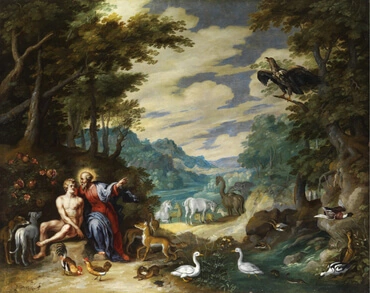In a general sense, then, Adam represents the Most Ancient Church. In specific, when named as an individual, he represents that church as it first began turning away from the Lord. In both senses, though, his story is spiritual history, not natural history. Adam is a figurative character, not an actual individual human being.
The word "adam" is Hebrew for "man" or "humankind," and it is consistently translated that way in the first chapter of Genesis. In fact, in that chapter "adam" is plural, and includes men and women: "So God created man (adam) in his own image, in the image of God created he him; male and female created he them" (Genesis 1:27, quoted from the King James Version of the Bible). Yet in later chapters – even including the genealogy of Jesus in Luke 3:38 – "Adam" is used as a name, and seems to refer to a specific person.
The first ripple in the relationship between God and humanity came as people began wanting a greater sense of life as their own, as they began to want to feel their love and wisdom as their own instead of things flowing in from God. The Lord gave them the power to feel as they wanted to, which is represented by the rib taken from the "man" Adam and formed into the "woman" Eve. This would, of course, lead to the downfall of humanity; because of that sense of self, people were drawn to the power of their own senses and their own minds – the serpent – instead of trusting the Lord. The Writings say the switch from "man" to "Adam" represents the change made in people when the Lord allowed them to have that sense of self. So what does this mean? The Writings tell us that the "man" created in Genesis represents the Most Ancient Church, which was the first church among early humans and was the purest ever to grace the earth. People of the church were motivated purely by the love of the Lord, and lived in peace, harmony, mutual love and inexpressible wisdom. This follows from the idea that the Lord is the one true human – and is, in fact, humanity itself. Since the Most Ancients were so close to the Lord, they are represented by "adam" in its meaning of "man" or "humankind." The common interpretation is that Genesis 1:26-28 is a general statement of the creation of people, and that the specifics of that creation are laid out in the next chapter when God first creates the man Adam and the woman Eve. But linguistically "adam" in the second chapter is the same as "adam" in the first chapter. In fact, while the King James Version of the Bible switches from "man" to "Adam" midway through the second chapter (Genesis 2:19), Young's Literal Translation – created to be as close to the original language as possible – does not use "Adam" as a named person until Genesis 4:25, long after the Garden of Eden. Eve, meanwhile, is simply "the woman" in all translations until Genesis 3:20, which is after she and Adam have eaten the forbidden fruit and been expelled from the Garden. Adam is one of the most crucial and most controversial figures in the Bible, dividing even the faithful into camps: those who believe he literally existed, created by God as the first human; and those who believe he is a figurative character, embodying spiritual and moral lessons but not an actual person.
In Genesis 2:19, Also that man was made from the ground, or from the non-man, by regeneration. (Arcana Coelestia 478, Arcana Coelestia 64, 313)
In Genesis 3:17, Adam's expulsion from Eden signifies the condemnation of those called Adam and Eve, the former of their intellectual part, the latter of their voluntary or will: in short of both degrees of their selfhood or proprium. Proprium is defined as "the love of self, and the derivative conceit of self-intelligence." (Doctrine Regarding Sacred Scripture 60, Divine Providence 313)







